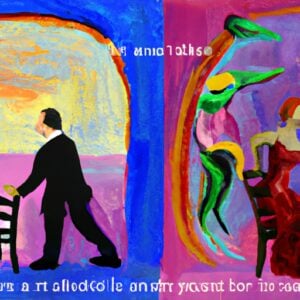What is futuro anteriore in Italian?
In Italian, there are two future tenses: the futuro semplice (simple future) and the futuro anteriore, or futuro composto (which is the same as the future perfect).
The latter, which we will explain in this lesson, is used to describe a future action that will have been completed before another future event takes place.
Quando avrai finito di lavare i piatti, potrai uscire.
When you have finished washing the dishes, you can go out.
As you can see in the example above, the futuro anteriore refers to an action that will be over (washing the dishes) before another future event takes place (going out), which is generally introduced by the futuro semplice.
Futuro anteriore: Conjugation
As you just saw, the futuro anteriore is formed by an auxiliary (essere or avere) conjugated in the future simple + past participle.
Remember, transitive verbs take avere, and intransitive verbs take essere.
| Mangiare (with avere)
to eat |
Andare (with essere)
to go |
| Io avrò mangiato | Io sarò partito/a* |
| Tu avrai mangiato | Tu sarai partito/a |
| Lui/Lei avrà mangiato | Lui/Lei sarà partito/a |
| Noi avremo mangiato | Noi saremo partiti/e |
| Voi avrete mangiato | Voi sarete partiti/e |
| Loro avranno mangiato | Loro saranno partiti/e |
*Have you noticed? When we use the verb essere (to be) as an auxiliary, the past participle of the conjugated verb agrees in number and gender with the subject performing the action.
Remember, regular past participles are super easy to form! Just get rid of the ending of the infinitive form and add the past participle ending:
- Verbs ending in ARE use ATO: mangi + are à mangi + ato = mangiato (to eat – eaten)
- Verbs ending in ERE use UTO: cred + ere à cred + uto = creduto (to believe – believed)
- Verbs ending in IRE use ITO: fin + ire à fin + ito = finito (to finish – finished)
Futuro anteriore: Other uses
In Italian, sometimes we use the futuro anteriore to make hypotheses about something that happened in the past.
The English equivalent for this use would be “must have”.
Let’s have a look at some examples:
Non sono ancora arrivati? Si saranno persi!
They haven’t arrived yet? They must have gotten lost.
Perché Marco è tornato indietro? Non so, si sarà dimenticato qualcosa.
Why did Marco come back? I don’t know; he must have forgotten something.
We can also use this tense to convey probability:
Quella macchina probabilmente gli è costata una fortuna. = Quella macchina gli sarà costata una fortuna.
That car must have cost him a fortune.
Practice with Quizlet
Here's a set of flashcards and quizzes to practice this grammar topic.Futuro anteriore: More examples
To use the futuro anteriore, you do not need to always have 2 actions.
You can also use it to indicate an action in the future that will have been completed by a certain time in the future.
Domani a quest’ora sarò arrivata a Roma.
At this time tomorrow, I will have arrived in Rome.
Alle 7 noi avremo finito di lavorare.
At 7 we will have finished working.
Greta si sarà laureata entro la fine dell’anno.
Greta will have graduated by the end of this year.









